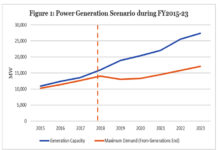Originally posted in The Business Standard on 16 March 2022

The day-to-day work at the Russian-supported Rooppur Nuclear Power Plant will not be disrupted by the Western countries’ decision to ban some Russian banks from the international SWIFT payment system.
The sanction came into effect on Saturday, and a day later Russia shifted heavy equipment to Rooppur by air for the first time amid maritime curbs.
A special cargo flight landed at the Hazrat Shahjalal International Airport on Sunday to offload the 84-tonne cargo.
Although sources said Russia would continue to supply by air until the sanctions were lifted, the suspension of its banks from the SWIFT system have led to some worries.
Russia’s Bank for Development and Foreign Economic Affairs (VEB), which made financial transactions for the Rooppur power plant, is one of those banks blacklisted.
Apart from that, there are fears that payments to subcontractors under the general contractor JSC Atomstroyexport, and local and Russian workers, would be impacted as the money to Russia went through Sonali Bank, sources said.
Project authorities, however, have said there is no relation of sanctions with the day-to-day work at the plant.
Speaking to The Business Standard, Mohammad Shawkat Akbar, managing director of the Nuclear Power Plant Company Bangladesh Ltd, said, “The project money does not come directly from Russia, they approve some documents only.”
Russian loan assistance does not come in Bangladesh
Bangladesh’s maiden nuclear power plant is being built at Rooppur of Pabna at a cost of $12.65 billion, with technical and financial support from Russia.
The first unit of the 2,400 megawatt (MW) plant is scheduled to start supplying electricity by 2024.
Of the total cost, Russia is providing 90% as loan assistance while the remaining 10% is being financed by the Bangladesh government.
Officials at the Rooppur Nuclear Power Plant said the loan assistance Russia provides is being spent on manufacturing the equipment of the project. The money Bangladesh disburses goes to Russian engineers, officials, construction workers and local labourers.
Engineer Md Anwar Hossain, former senior secretary at the science and technology ministry, which took the project, said like other projects, the loan assistance did not come to Bangladesh and was not being disbursed to implementing agencies.
“Instead, milestone papers are being signed by project directors on both sides and taken to the Russian VEB bank for releasing bills to the general contractor JSC Atomstroyexport, a subsidiary of Rosatom,” Anwar Hossain said at a virtual discussion organised by the Energy and Power magazine last week.
“Then our Economic Relations Division of the finance ministry receives a record of that cost against the milestone progress.”
So, the SWIFT ban won’t have any effect on this part of finance, he said.
Worries over fund transfer to Russia
Bangladesh used to send the money to the general contractor JSC Atomstroyexport through Sonali Bank on a quarterly basis. A part of the money flows back into Bangladesh through different banks in the form of bills to local and international subcontractors working at the Rooppur project site.
The first quarter’s payment was already sent to Russia last January and the second quarter was supposed to be sent by 30 April, said officials with direct knowledge of the matter.
They said if the SWIFT ban remained effective for a long time, money circulation to subcontractors through the general contractor would be impacted.
Regarding the payments to Russia, Anwar Hossain believes that an alternative can be decided if officials of the Russian central bank and the finance ministry sit together.
“Banking can be done without SWIFT, which was launched in 1973. There are some other inter-bank transaction methods apart from SWIFT. Banks can run their operations in different ways, which we have seen in Iran, North Korea and Myanmar,” he said.






